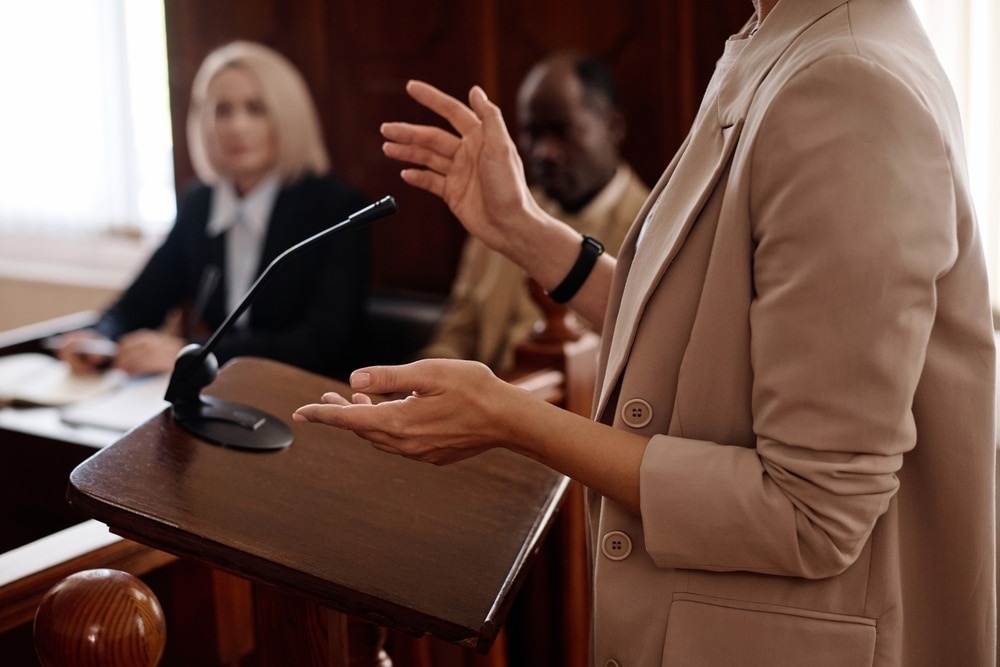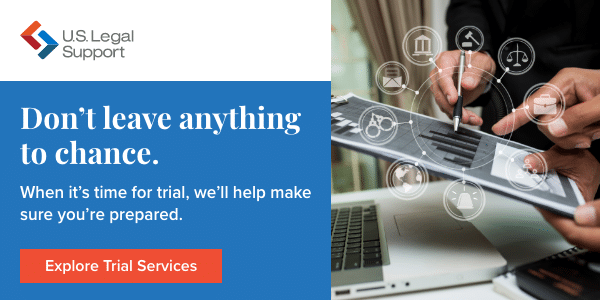Best Practices for Preparing an Expert Witness for Deposition

As a trial attorney, you’ll often enlist expert witnesses to evaluate claims, clarify complex evidence, write an expert witness report, and offer authoritative opinions. Because time and money can be tight during trial prep, it’s tempting to skimp on witness preparation. However, expert testimony is often pivotal to the outcome of a case, and a strong deposition performance can lead to higher settlement values.
That’s why conducting proper witness preparation is such an important opportunity to help deliver positive results for your client.
A strong deposition testimony is largely a function of the work you and your expert put in together before the deposition. So to ensure your expert’s testimony is an asset, rather than a liability, follow these best practices for preparing an expert witness for deposition.
#1 Study Previous Depositions
The first step is to identify your expert’s particular strengths and weaknesses. To that end, you should review transcripts of their recent depositions (if available).
When studying a deposition transcript, monitor your expert’s response patterns and keep an eye out for problematic habits, such as:
- Evading questions
- Making jokes
- Interrupting opposing counsel or witnesses
- Using academic jargon
- Speculating or fudging numbers
- Going on too long during responses
Once you’ve pinpointed areas for improvement, you can work with your witness to address these tendencies.
Ensure that you deliver constructive criticism in a way that allows the witness to be receptive rather than defensive. Emphasize that you are on the same team and both desire a positive outcome.
#2 Master the Facts
Impactful expert deposition testimony rests on a firm and comprehensive grasp of the facts involved in the case. Your expert should be able to readily recall names, dates, figures and pertinent evidence.
Careful study of the facts helps your witness to:
- Respond confidently to difficult questions
- Make a positive impression on the jury
- Spot questions that are not grounded in the facts
Emphasize to your expert that factual mastery will make their lives easier when on the stand and can enhance their professional reputation.
It’s also crucial to meticulously organize all documents and materials. Walk your witness through any binders, folders, and PDFs so they can find what they need while under pressure.
#3 Practice Positive Body Language
The gestures, posture, and non-verbal cues a witness exhibits on the stand will have a strong influence on the jury. It’s important that your expert comes across as open, cooperative, and eager to employ their knowledge to clarify complex topics.
Positive body language can include1:
- Strong eye contact (with opposing counsel, juries, or witnesses)
- Relaxed breathing
- Slow, deliberate speech
- Open arms and upright posture
It’s also a good habit to use affirmative gestures, such as head nodding, while listening to others. When rehearsing with your expert, keep an eye on their body language and offer suggestions as appropriate.
#4 Steer Clear of Overconfidence
While confidence is an excellent trait in expert witnesses, excessive confidence can land poorly with juries and damage credibility.
The ideal expert witness should come across as informed and intelligent, yet willing to acknowledge their limitations and embrace the fact that their testimony is just one piece of the puzzle.
Some habits that can help your witness avoid appearing overconfident include:
- Refraining from sweeping statement and absolute terms (“always”, “never”)
- Qualifying their testimony with words like “often”, “may”, “sometimes”
- Citing other authorities and the facts of the case to support statements
This can be a fine line to walk, but it’s worth putting in the time to help your expert strike the right balance—juries have little patience for witnesses who come across as pompous or stuck in a particular, absolutist perspective.
#5 Outline Opposing Counsel’s Approach
Since opposing counsel will be the ones to put them under the microscope, you should discuss the opposition’s likely goals and tactics with your expert.
The opposition’s main objective will be to disqualify your expert’s opinions under Rule 702 of the Federal Rules of Evidence (or Daubert as it is often known).2 Rule 702 defines the requisite standards for expert testimony. In short, the hiring attorney must establish that:
- The expert’s knowledge, training, and experience will help clarify the evidence or issues
- The expert’s testimony is grounded in facts and arrived at by dependable methods
- The expert’s opinions stem from a careful application of these methods and principles
Opposing counsel will be on the lookout for any opportunity to force your expert into making absolute yes or no statements, call their expertise into question, or pressure them into making assertions that are unsupported by the facts in their expert report. Attempts to wear out or unnerve your witness through fishing expeditions are also common.
Re-emphasize the importance of honest, factual answers, confident body language, and establish that simply saying, “I don’t know,” is acceptable if they are unable to answer a question.
#6 Limit the Scope of Testimony
Tied, in part, to overconfidence: it’s important to keep your witness grounded in their field. While a witness may feel confident discussing other disciplines, remind them that you’ve solicited their testimony because of their experience in one specific domain.
Juries and the court system typically have low confidence in someone purporting to be a polymath or universal expert.3
To maintain expert credibility, your witness should:
- Answer questions in factual and concrete ways
- Make their point succinctly
- Avoid volunteering information beyond their domain
Remember: humility is critical to establishing credibility.
#7 Walk Through Deposition Procedures
You want your witness to feel comfortable and confident throughout the deposition process. Getting caught off guard by unfamiliar procedures may rattle them. To prevent this, it’s wise to spend some time outlining how the mechanics of the deposition will work.
Two main topics to cover before deposition day:
- Clarify the scope of questioning – Opposing counsel has ample freedom to pose questions, and they may sometimes go fishing. Remind your expert to remain calm and grounded in the facts if the examination strays a bit far afield.
- Explain that you have limited objections – Since depositions don’t have a judge present to handle objections, the expert must answer all of the opposing counsel’s questions, even if you object. The judge may rule on objections at a later date.
If your expert has substantial deposition experience, you can spend less time on this step than with a newer expert, but it’s still advisable to review procedures ahead of time.
#8 Handle Logistics
A deposition is a physical as well as intellectual experience. The location, time of day, and other individuals in attendance can all affect the quality of your expert’s testimony.
It will serve both you and your witness well to thoroughly cover the details of the event. Make sure there is absolute clarity on:
- Location of the deposition
- Parking availability
- Dress code
- Length of deposition
- Payment details (who will pay for the testimony and when compensation will arrive)
- Presence of video camera/recording equipment in the deposition
If you have scheduling flexibility, it is an excellent idea to ask your expert what times of day they feel most alert and capable. Some may prefer first thing in the morning, and others may be night owls. If possible, go with whatever time the expert feels will render them most effective.
The less your witness has to worry about logistical concerns, the more they can focus on confidently delivering their insights.
#9 Practice Makes Perfect
Excellent testimony is very much a performance, and as with any performance: practice is key. In addition to the above tips, you should also invest as much time as possible into conducting a mock deposition with your expert.
There are many benefits of a mock trial for your expert witness. These rehearsal sessions are the ideal setting for drilling down on undesirable habits, establishing strong body language, and analyzing the opposition’s game plan.
During a mock deposition, you should put your witness through their paces with regard to their:
- Background and CV
- Expert report (if they wrote one)
- Process for drawing conclusions
- Opinions
- Potential biases
If possible, you should videotape their responses and review them together afterward. This can go a long way in ensuring your team and witness are on the same page about how to approach the deposition.
You may also want to give your witness homework, such as watching footage of superb expert testimony or performing a thorough review of their CV and compensation (there’s no reason to let your expert get hung out to dry over a simple resume or financial detail).
Prepare Your Expert Witness, With U.S. Legal Support
At U.S. Legal Support, our trial services division includes a roster of seasoned professionals from TrialEx who are ready to collaborate with your team. We’ll help craft your witness’ message, coach their body language, and hone their practice performance.
We also offer assistance with jury research, trial exhibit design, and conducting focus groups. Reach out today to discover how we can help you and your team get ready for trial.
Sources:
- ASU CareerCatalyst. Share Your Scientific and Technical Knowledge in Court: Four Best Practices for Expert Testimony. https://careercatalyst.asu.edu/newsroom/career/four-best-practices-for-effective-expert-testimony/
- Cornell Law School Legal Information Institute. Rule 702. Testimony by an Expert Witness. https://www.law.cornell.edu/rules/fre/rule_702
- National Institute of Justice. Law 101: Legal Guide for the Forensic Expert. https://nij.ojp.gov/nij-hosted-online-training-courses/law-101-legal-guide-forensic-expert/general-testifying-tips/tips-expert-witness-direct-and-cross-examination
- United States Courts. Covering Civil Cases-Journalist Guide. https://www.uscourts.gov/statistics-reports/covering-civil-cases-journalists-guide

Editoral Policy
Content published on the U.S. Legal Support blog is reviewed by professionals in the legal and litigation support services field to help ensure accurate information. The information provided in this blog is for informational purposes only and should not be construed as legal advice for attorneys or clients.


